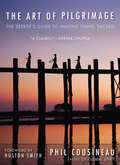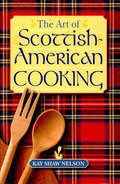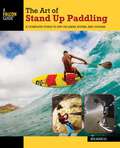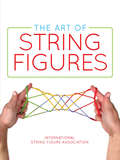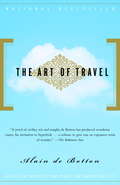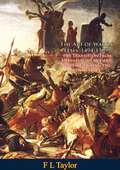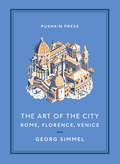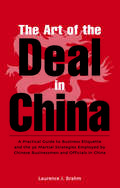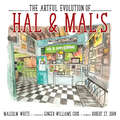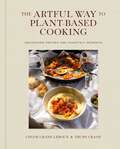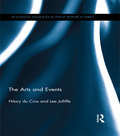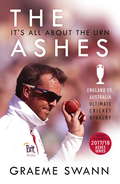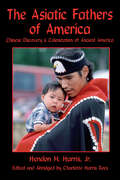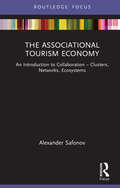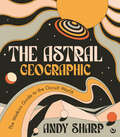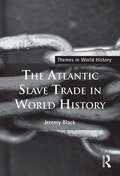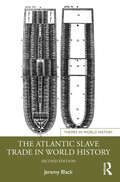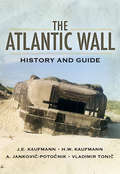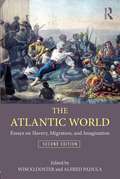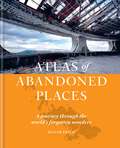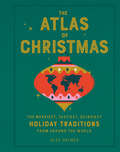- Table View
- List View
The Art of Pilgrimage: The Seeker's Guide to Making Travel Sacred
by Phil CousineauA literary and meditative guide to bringing purpose and meaning to every journey you take, now updated with a new preface by the author. We are descendants of nomads. And although we no longer partake in this nomadic life, the instinct to travel remains. Whether we&’re planning a trip or buying a secondhand copy of Siddhartha, we&’re always searching for some kind of pilgrimage. With remarkable stories from famous travelers, poets, and modern-day pilgrims, The Art of Pilgrimage is for the mindful traveler who longs for something more than diversion and escape. Through literary travel stories and meditations, award-winning writer, filmmaker, and host of the acclaimed Global Spirits series Phil Cousineau shows readers that travel is worthy of mindfulness and spiritual examination. Whether traveling to Mecca or Memphis, Stonehenge or Cooperstown, one&’s journey becomes meaningful when the traveler&’s heart and imagination are open to experiencing the sacred. This edition of The Art of Pilgrimage includes a new preface by the author, more than seventy illustrations, and stories, myths, parables, and quotes from many travelers and many faiths.
The Art of Scottish-American Cooking
by Kay Shaw NelsonThis history, travelogue and cookbook contains over two hundred recipes celebrating four centuries of Scottish cultural and culinary legacy in America. In this comprehensive cookbook, learn about the glories of shortbread, or Scotch cake, a unique Scottish creation, as well as marvelous rock buns and Dundee cake. Find out how the Scots introduced fried chicken to America and enjoy recipes for happit hen, wet devil, and Scotch grouse. Digest the histories of the Campbell Soup company, Old Crow Bourbon whiskey, and the graham cracker, invented by the eccentric clergyman Sylvester Graham. Try your hand at innovative egg dishes, fish pies, Scottish hot dogs, oatcakes, scones, griddle breads, and crumpets. Finally, make an ale toast at Hogmanay (New Year&’s Eve) and ring in the New Year celebrating the many Scottish American contributions to our daily lives. Scottish-American author Kay Shaw Nelson has combined her ancestral pride, her travel experiences and love of gastronomy to create The Art of Scottish-American Cooking, an homage to four hundred years of Scottish food and drink in the United States and Canada. The cookbook includes more than two hundred recipes as well as a wealth of information about Scottish holidays, heroes, traditions, and notable culinary and other cultural achievements by Scottish Americans. &“A book that we can keep at hand to keep Scottish and American dishes vibrantly alive . . . for generations to come.&” —Valerie Kearny, editor, The Scottish Banner &“Salutes Scottish-Americans who have a natural respect for fine fare and traditional hospitality.&” —Anne Robertson Kennedy, founder-president, The Living Legacy of Scotland, Inc.
The Art of Stand Up Paddling: A Complete Guide to SUP on Lakes, Rivers, and Oceans (How to Paddle Series)
by Ben MarcusStand up paddling (SUP) is experiencing fast growth in the United States and around the world. It can be enjoyed on inland lakes and rivers, as well as on the ocean and in the surf—but most important, it&’s fun and a great way to stay fit. The Art of Stand Up Paddling will include everything both new and not-so-new paddlers need to know—from buying a board and getting started on your local lake to paddling rivers and surfing ocean waves. This revised edition features a brand new chapter on SUP Yoga, which combines the passion of yoga with the art of stand up paddling. Also included is a fascinating and controversial history of stand up paddling, which, although new to many, dates back hundreds of years to Peruvian fishermen, Venetian gondoliers, and Hawaiian beach boys. Chapters on surf-break etiquette, fitness, yoga, and the exhilarating potential for adventures on a stand up paddleboard makes this a complete resource for beginners and experienced paddlers alike.
The Art of String Figures
by International String Figure AssociationCompiled from issues of String Figure Magazine, simple instructions and easy-to-follow photographs offer step-by-step guides to creating more than two dozen captivating string figures, accompanied by brief accounts of their historical background.
The Art of Travel (Vintage International)
by Alain De BottonAny Baedeker will tell uswherewe ought to travel, but only Alain de Botton will tell ushowandwhy. With the same intelligence and insouciant charm he brought toHow Proust Can Save Your Life,de Botton considers the pleasures of anticipation; the allure of the exotic, and the value of noticing everything from a seascape in Barbados to the takeoffs at Heathrow. Even as de Botton takes the reader along on his own peregrinations, he also cites such distinguished fellow-travelers as Baudelaire, Wordsworth, Van Gogh, the biologist Alexander von Humboldt, and the 18th-century eccentric Xavier de Maistre, who catalogued the wonders of his bedroom. The Art of Travelis a wise and utterly original book. Don’t leave home without it. From the Trade Paperback edition.
The Art of War in Italy, 1494-1529: the Transition From Mediaeval to Modern Warfare During the Renaissance
by F L Taylor“The birth of 'New War' in ItalyIt is easy to consider the Renaissance as a time of enlightenment typified principally by the artistic and scientific genius of Leonardo da Vinci and his peers; but giant leaps forward are never confined to one aspect of society and the application of new ideas is always adapted to various purposes and the meeting of differing objectives. The creation of modern political science by Niccolo Machiavelli is a prime example of how new ways of thinking and doing impacted on the advancement and securing of power. These changes were inevitably accompanied by significant developments in making war more effectively, strategically and tactically-with corresponding advances in weaponry and other equipage. This excellent book considers these developments through the changes to traditional military strategy and the use of infantry, cavalry and artillery, in both open battle and fortification and siege-craft, at the turn of the sixteenth century.”-Print ed.
The Art of the City: Rome, Florence, Venice (Pushkin Collection)
by Georg SimmelA quartet of essays on great European cities from the groundbreaking thinker Georg SimmelThese brilliant essays, from one of Germany's greatest and most influential thinkers, are beautifully written and highly readable portraits of three Italian cities: Rome, Venice and Florence. Simmel saw the city as a work of art in itself, and taken together these pieces act as a powerful suite expounding that notion.A seminal work of psycho-geography, this collection has never been published together in English before.
The Art of the Deal
by Laurence J. Brahm"Cigarette smoke whirled to the ceiling filling the room like incense in a Taoist temple. Chessboard silence filled that area of the room not already suffuse with cigarette smoke. " -ForewordNegotiating a deal in China requires patience-a well-known Confucian virtue; persistence-something which comes with time; and survival instincts-something that comes with persistence. For both the uninitiated, negotiations in China may come as a culture shock, laced with frustration. For the experience China trade negotiator, it is a never-ending learning process. For both parties, the secret to negotiating in China may well lie in the knowledge of the military ploys described in China's ancient classics.In The Art of the Deal in China, author Laurence J. Brahm applies Sun Tzu's Art of War, the ultimate guru's statement of military strategy and the Thirty-six Strategies, a collection of sayings which capsulize strategic prowess in ancient Chinese history, to modern-day negotiating situations in China, both commercial and political. The stories in the book, all based on actual happenings, will not only amuse but will provide hope to many foreigners engaged in the often drawn -out and frustrating process of negotiating a deal in China.
The Art of the Deal
by Laurence J. Brahm"Cigarette smoke whirled to the ceiling filling the room like incense in a Taoist temple. Chessboard silence filled that area of the room not already suffuse with cigarette smoke. " -ForewordNegotiating a deal in China requires patience-a well-known Confucian virtue; persistence-something which comes with time; and survival instincts-something that comes with persistence. For both the uninitiated, negotiations in China may come as a culture shock, laced with frustration. For the experience China trade negotiator, it is a never-ending learning process. For both parties, the secret to negotiating in China may well lie in the knowledge of the military ploys described in China's ancient classics.In The Art of the Deal in China, author Laurence J. Brahm applies Sun Tzu's Art of War, the ultimate guru's statement of military strategy and the Thirty-six Strategies, a collection of sayings which capsulize strategic prowess in ancient Chinese history, to modern-day negotiating situations in China, both commercial and political. The stories in the book, all based on actual happenings, will not only amuse but will provide hope to many foreigners engaged in the often drawn -out and frustrating process of negotiating a deal in China.
The Artful Evolution of Hal & Mal’s
by Malcolm WhiteThe Artful Evolution of Hal & Mal's is a collaboration between artist Ginger Williams Cook and author Malcolm White about the people, the place, and the history of Hal & Mal's, an iconic institution in downtown Jackson, Mississippi.Featuring beautiful watercolor paintings, the book brings together thirty years of family history, live music performances, and cafe society through graphic designs of old photographs, original illustrations, Hal's legendary recipe cards, and the written word. Opening with a foreword by the renowned author and chef Robert St. John and featuring Ginger's bold and vibrant look at a place she grew up patronizing, The Artful Evolution of Hal & Mal's captures the reflective, quirky voice of one half of the dynamic team known to millions as Hal & Mal.Hal & Mal's was conceived by brothers Hal and Malcolm White. The dream was rooted in a childhood on the Mississippi Gulf Coast, reinforced by years of living and working in New Orleans, and ultimately launched in Jackson in 1985. This gathering place has always been owned and operated by family--now the second and third generations. The multifunctional, southern-soul-soaked rooms are adorned with memorabilia and chock-full of local character; each one also features a stage for live music. The kitchen serves a steady offering of hearty regional staples with a nod toward the Gulf of Mexico.Hal & Mal's is the most-talked-about upscale honky-tonk in all of Mississippi, where art is made, music plays, and folks gather to share community and celebrate the very best of Mississippi's creative spirit.
The Artful Way to Plant-Based Cooking: Nourishing Recipes and Heartfelt Moments (A Cookbook)
by Chloé Crane-Leroux Trudy CraneA unique collection of plant-based recipes from the mother-and-daughter duo who were inspired by the simple beauty and delicious meals throughout their travels.Throughout European countries like Spain, France, and Italy, cooking with fresh, local ingredients is a way of life. That&’s where this mother-and-daughter duo found inspiration during their travels to write their book in the richness of food, the beauty of architecture, and the wonder of luscious landscapes. But…authors Trudy and Chloé are plant-based. The Artful Way to Plant-Based Cooking isn&’t just a healthy collection of recipes that leave you feeling hungry like so many others. It&’s a cookbook that offers flavorful dishes for every meal and every moment of the day, from appetizers like Vibrant Beet and Pistachio Hummus; date-night dishes such as Pappardelle Mushroom Bolognese; main dishes, like the Ricotta and Squash Galette, perfect for entertaining; and desserts like Strawberry and Cream Cake or Decadent Double Dark Chocolate Cookies. These 80 recipes are not only good for you—they&’re good for the planet, too! The love this mother and daughter have for each other—and for sharing vegan food with others—shines through in their recipes and is sure to be a joy for everyone.
The Arts and Events (Routledge Advances in Event Research Series)
by Lee Jolliffe Hilary Du CrosCultural heritage and contemporary arts benefit from being showcased in events. Arts-related events are each unique in reflecting local culture; they may be therefore spontaneous (street art and so on) or planned (i.e. studio tours or arts festivals). The Arts and Events explores the nature and complexity of managing arts events and fills a significant gap in the available literature. It investigates the history, development and management of arts events to offer much needed insight into creating economic, social and cultural capital. It therefore contributes to a greater understanding of how arts events can create a beneficial experience for the individual and the community as well as their future sustainable development. The title explores a broad range of events from around the globe including: inspirational events for building creative (social, cultural and human) capital; affirming events for encouraging links to cultural identity or heritage; pleasurable events that offer enjoyable recreational, leisure and touristic experiences; enriching events that create opportunities for personal growth and/or to sell products or experiences, and finally, celebratory events that enhance cultural diversity. This significant volume is a valuable source for researchers, policy-makers and managers of arts events around the globe.
The Ashes: England vs. Australia: ultimate cricket rivalry
by Graeme SwannShortlisted for Cricket Book of the Year at the British Sports Book AwardsGraeme Swann leads us on a compelling adventure through one of world sport's most engrossing rivalries. He knows as much as anybody about the heat of England v Australia battles, having played in three series wins and also the whitewash defeat of 2013-14 when its intensity ended his international career. However, it brought out some of his best displays in Test cricket. But he is just one of dozens of colourful characters to have added their chapters to this great tome. The mock obituary of English cricket in the Sporting Times of 1882 was the forerunner of summers and winters of heaven and hell, depending on which side of the divide you were situated. When it comes to on-field relations nothing quite compares to the over-my-dead-body feel of the Ashes.From Grace to Sir Don, the most graceful of them all. From the foulest play to the fairest - contrast the 1932-33 Bodyline series affair to the image of Andrew Flintoff hunched over a distraught Brett Lee in 2005. From Ray Illingworth's famous walk-off in the Seventies, when an England team-mate was assaulted by a spectator, to Steve Waugh's hugely emotional lap of honour when he retired a quarter of a century later. Swann's book will reveal the magic of a series that first gripped him in his front room in Northampton as an aspiring spin bowler in the mid-1980s.
The Ashes: England vs. Australia: ultimate cricket rivalry
by Graeme SwannGraeme Swann leads us on a compelling adventure through one of world sport's most engrossing rivalries. He knows as much as anybody about the heat of England v Australia battles, having played in three series wins and also the whitewash defeat of 2013-14 when its intensity ended his international career. However, it brought out some of his best displays in Test cricket. But he is just one of dozens of colourful characters to have added their chapters to this great tome. The mock obituary of English cricket in the Sporting Times of 1882 was the forerunner of summers and winters of heaven and hell, depending on which side of the divide you were situated. When it comes to on-field relations nothing quite compares to the over-my-dead-body feel of the Ashes.From Grace to Sir Don, the most graceful of them all. From the foulest play to the fairest - contrast the 1932-33 Bodyline series affair to the image of Andrew Flintoff hunched over a distraught Brett Lee in 2005. From Ray Illingworth's famous walk-off in the Seventies, when an England team-mate was assaulted by a spectator, to Steve Waugh's hugely emotional lap of honour when he retired a quarter of a century later. Swann's book will reveal the magic of a series that first gripped him in his front room in Northampton as an aspiring spin bowler in the mid-1980s.
The Ashes: ultimate cricket rivalry
by Graeme SwannGraeme Swann leads us on a compelling adventure through one of world sport's most engrossing rivalries. He knows as much as anybody about the heat of England v Australia battles, having played in three series wins and also the whitewash defeat of 2013-14 when its intensity ended his international career. However, it brought out some of his best displays in Test cricket. But he is just one of dozens of colourful characters to have added their chapters to this great tome. The mock obituary of English cricket in the Sporting Times of 1882 was the forerunner of summers and winters of heaven and hell, depending on which side of the divide you were situated. When it comes to on-field relations nothing quite compares to the over-my-dead-body feel of the Ashes.From Grace to Sir Don, the most graceful of them all. From the foulest play to the fairest - contrast the 1932-33 Bodyline series affair to the image of Andrew Flintoff hunched over a distraught Brett Lee in 2005. From Ray Illingworth's famous walk-off in the Seventies, when an England team-mate was assaulted by a spectator, to Steve Waugh's hugely emotional lap of honour when he retired a quarter of a century later. Swann's book will reveal the magic of a series that first gripped him in his front room in Northampton as an aspiring spin bowler in the mid-1980s.
The Asiatic Fathers of America: Chinese Discovery & Colonization of Ancient America
by Charlotte Harris Rees Hendon M. Harris Jr.Much evidence from both sides of the Pacific indicates that people from Asia reached America at very early dates. It also appears that at least occasional trips were made back to Asia. This book explores some of the early Asian accounts about voyages to a beautiful land to their east called Fu Sang. It explains how that trip was possible. Included are photos of an ancient Asian world map that show the location of the fabled Fu Sang -right where America should be.
The Associational Tourism Economy: An Introduction to Collaboration - Clusters, Networks, Ecosystems (Routledge Focus on Tourism and Hospitality)
by Alexander SafonovThis timely and innovative book provides a comprehensive introduction to the concept of the associational tourism economy, exploring the collaborative nature of tourism as an interconnected system, with a focus on tourism clusters, networks, and ecosystems.When tourists travel, they interact with a complex web of businesses, organisations, and individuals who can act independently or with a greater or lesser level of collaboration among themselves. This interdependence emphasises that the associational tourism economy is not merely about the mobility of people but also concerns interconnected socio-economic systems that shape where and why people travel. Replete with illuminating tables and diagrams, this book lays a foundation for understanding the complex, associational nature of the tourism economy from both business and policy perspectives. An extensive overview of the evolution of theoretical concepts of associational economics provides the framework for a clear breakdown of the intricate collaborative, competitive, and interpersonal relations that make up the economics of tourism, with insights into how these relations can be built and fostered to promote sustainable tourism and boost local economies.This book will be of pivotal interest to students, scholars, and academics of tourism and hospitality research, tourism planning and development, tourism management, and tourism geography.
The Astral Geographic: The Watkins Guide to the Occult World
by Andy SharpEXPLORE THE LANDSCAPES OF THE OCCULT – EXPAND THE HORIZONS OF YOUR CONSCIOUSNESSThis ground-breaking new approach to the history of magic explores the occult through geography, inviting you to embark on ten astral travel journeys that span centuries and continents. Each itinerary comes complete with a route map, postcards of the sites, artworks of magical artefacts and an essay exploring a key occult theme, from necromancy and alchemy to standing stones and drowned cities. Follow in the hoof steps of the Devil from ancient Egypt to London&’s Hellfire Club to the black magic venues of 1960s San Francisco; invoke angels and demons in the Algerian desert; meet witches in the Mediterranean temples of Hekate and Circe and the ancient cemeteries of Scandinavia; practise cloud divination in druidic Ireland then travel to the English countryside in search of hidden hexes … and much more! Finally, try practising magic for yourself using the Grimorium Terra, a manual that teaches how to use geography as a magical tool. Discover how to perform rituals in different terrains, use your surroundings to catalyze altered states of consciousness, explore astral travel and seed your own lucid dreams!
The Atlantic Slave Trade in World History (Themes in World History)
by Jeremy BlackIn The Atlantic Slave Trade in World History, Jeremy Black presents a compact yet comprehensive survey of slavery and its impact on the world, primarily centered on the Atlantic trade. Opening with a clear discussion of the problems of defining slavery, the book goes on to investigate the Atlantic slave trade from its origins to abolition, including comparisons to other systems of slavery outside the Atlantic region and the persistence of modern-day slavery. Crucially, the book does not ask readers to abandon their emotional ties to the subject, but puts events in context so that it becomes clear how such an institution not only arose, but flourished. Black shows that slavery and the slave trade were not merely add-ons to the development of Western civilization, but intimately linked to it. In a vital and accessible narrative, The Atlantic Slave Trade in World History enables students to understand this terrible element of human history and how it shaped the modern world.
The Atlantic Slave Trade in World History (Themes in World History)
by Jeremy BlackNow in its second edition, The Atlantic Slave Trade in World History has been updated to include recent scholarship, and an analysis of how debates have changed in light of recent key events such as the Black Lives Matter movement.Primarily focused on the Atlantic Slave Trade, this study places slavery within a broader world context and includes significant detailed coverage of Africa. With a chronological approach, it guides students through the origins of the Atlantic Slave Trade to its expansion and eventual abolition. Its final chapters explore the legacy of the Atlantic Slave Trade by comparing it to other systems of slavery outside of the Atlantic region, and analyze the persistence of modern-day slavery. As well as offering an analysis of historiography, the updated bibliography and conclusion, which considers the recent Black Lives Matter protests and their aftermath, provide a fresh account of how slavery has shaped our understanding of the modern world.Unmatched in its breadth of information, chronological sweep, and geographical coverage, The Atlantic Slave Trade in World History is the most useful introductory resource for all students who study the Atlantic Slave Trade in a world context.
The Atlantic Wall: History and Guide
by A. Jankovic-Potocnik H. W. Kaufmann J. E. Kaufmann Vladimir TonicThis WWII history and visitor&’s guide explores the extensive network of Nazi fortifications built to defend Fortress Europe. Hitler's Atlantic Wall, the complex system of coastal fortifications that stretched from Norway to the Spanish border during the Second World War, was built to defend occupied Europe from Allied invasion. Many of its principal structures survive and can be visited today. This authoritative guide provides both practical information for visitors and essential historical context. The wall, which was constructed on a massive scale between 1942 and 1944 by German engineers, forced laborers and troops, consisted of strong points, artillery casemates, bunkers, troop shelters, minefields, anti-tank and anti-boat obstacles. It also included the concrete U-boat and E-boat pens in the key ports and, behind the Channel coast, the V-weapon sites. This huge scheme of fortifications was one of the longest series of defensive lines in military history. This comprehensive volume takes readers and visitors through the entire story of the fortifications from the fall of France to the D-Day invasion on the beaches of Normandy that finally broke through. As a guide to some of the most impressive relics of the Second World War, this book is essential reading for travelers or anyone interested in the liberation of occupied Europe.
The Atlantic World: Essays on Slavery, Migration, and Imagination
by Willem Klooster Alfred PadulaThe Atlantic World: Essays on Slavery, Migration, and Imagination brings together ten original essays that explore the many connections between the Old and New Worlds in the early modern period. Divided into five sets of paired essays, it examines the role of specific port cities in Atlantic history, aspects of European migration, the African dimension, and the ways in which the Atlantic world has been imagined. This second edition has been updated and expanded to contain two new chapters on revolutions and abolition, which discuss the ways in which two of the main pillars of the Atlantic world—empire and slavery—met their end. Both essays underscore the importance of the Caribbean in the profound transformation of the Atlantic world in the late eighteenth and early nineteenth centuries. This edition also includes a revised introduction that incorporates recent literature, providing students with references to the key historiographical debates, and pointers of where the field is moving to inspire their own research. Supported further by a range of maps and illustrations, The Atlantic World: Essays on Slavery, Migration, and Imagination is the ideal book for students of Atlantic History.
The Atlas of Abandoned Places
by Oliver SmithThe globe is littered with forgotten monuments, their beauty matched only by the secrets of their past.A glorious palace lies abandoned by a fallen dictator. A grand monument to communism sits forgotten atop a mountain. Two never-launched space shuttles slowly crumble, left to rot in the middle of the desert. Explore these and many more of the world's lost wonders in this atlas like no other.With remarkable stories, bespoke maps and stunning photography of fifty forsaken sites, The Atlas of Abandoned Places travels the world beneath the surface; the sites with stories to tell, the ones you won't find in any guidebook.Award-winning travel writer Oliver Smith is your guide on a long-lost path, shining a light on the places that the world forgot.Locations featured in the book include:Europe: Maunsell Forts, Aldwych Station, Paris Catacombs, La Petite Ceinture, Craco, Teufelsberg, Beelitz-Heilstätten, Red Star Train Graveyard, Pyramiden, Salpa Line, Buzludzha Monument, Pripyat, Wolf's Lair, Project Riese, Sarajevo Bobsleigh Track, Albanian Bunkers, Rummu QuarryThe Americas & the Carribean: New Bedford Orpheum Theatre, City Hall Station, Bodie, The Boneyards of Western USA, Bannerman Castle, Palace of Sans Souci, Montserrat Exclusion Zone, Ciudad Perdida, Humberstone and Santa Laura, Uyuni Train Cemetery, FordlândiaThe Middle East & the Caucasus: Kayaköy, Burj Al Babas, Varosha, Tskaltubo, Palaces of SaddamAsia: Ryugyong Hotel, Buran at Baikonur, Mo'ynoq Ship Graveyard, Aniva Lighthouse, Hô' Thuy Tiên Waterpark, Fukushima Red Zone, HashimaOceania: Wittenoom, Wrecks of Homebush Bay, Port Arthur, MS World Discoverer, Second World Remains of Papua New GuineaAfrica: Shipwrecks of the Skeleton Coast, Kolmanskop, Mobutu's Gbadolite, Mos Espa, São Martinho dos Tigres
The Atlas of Abandoned Places
by Oliver SmithThe globe is littered with forgotten monuments, their beauty matched only by the secrets of their past.A glorious palace lies abandoned by a fallen dictator. A grand monument to communism sits forgotten atop a mountain. Two never-launched space shuttles slowly crumble, left to rot in the middle of the desert. Explore these and many more of the world's lost wonders in this atlas like no other.With remarkable stories, bespoke maps and stunning photography of fifty forsaken sites, The Atlas of Abandoned Places travels the world beneath the surface; the sites with stories to tell, the ones you won't find in any guidebook.Award-winning travel writer Oliver Smith is your guide on a long-lost path, shining a light on the places that the world forgot.Locations featured in the book include:Europe: Maunsell Forts, Aldwych Station, Paris Catacombs, La Petite Ceinture, Craco, Teufelsberg, Beelitz-Heilstätten, Red Star Train Graveyard, Pyramiden, Salpa Line, Buzludzha Monument, Pripyat, Wolf's Lair, Project Riese, Sarajevo Bobsleigh Track, Albanian Bunkers, Rummu QuarryThe Americas & the Carribean: New Bedford Orpheum Theatre, City Hall Station, Bodie, The Boneyards of Western USA, Bannerman Castle, Palace of Sans Souci, Montserrat Exclusion Zone, Ciudad Perdida, Humberstone and Santa Laura, Uyuni Train Cemetery, FordlândiaThe Middle East & the Caucasus: Kayaköy, Burj Al Babas, Varosha, Tskaltubo, Palaces of SaddamAsia: Ryugyong Hotel, Buran at Baikonur, Mo'ynoq Ship Graveyard, Aniva Lighthouse, Hô' Thuy Tiên Waterpark, Fukushima Red Zone, HashimaOceania: Wittenoom, Wrecks of Homebush Bay, Port Arthur, MS World Discoverer, Second World Remains of Papua New GuineaAfrica: Shipwrecks of the Skeleton Coast, Kolmanskop, Mobutu's Gbadolite, Mos Espa, São Martinho dos Tigres
The Atlas of Christmas: The Merriest, Tastiest, Quirkiest Holiday Traditions from Around the World
by Alex PalmerDiscover the fascinating (and sometimes downright odd!) ways that people and nations celebrate the holiday season and share this festive compendium's unique traditions together with family and friends.Do you know that in Guatemala there's a "Burn the Devil" tradition to kick off the Christmas season, where revelers gather to set fire to devil-piñatas? In Sweden, a popular figure in Christmas traditions is the Yule Goat, a rowdy, menacing character who demands gifts. And in Japan, a big bucket of Kentucky Fried Chicken has become the classic Christmas Day feast. These and many other global Christmas traditions are featured here in this delightful book. From decorations and activities to feasts and special treats, there's a wide range of both lovely and unusual traditions from around the globe.
